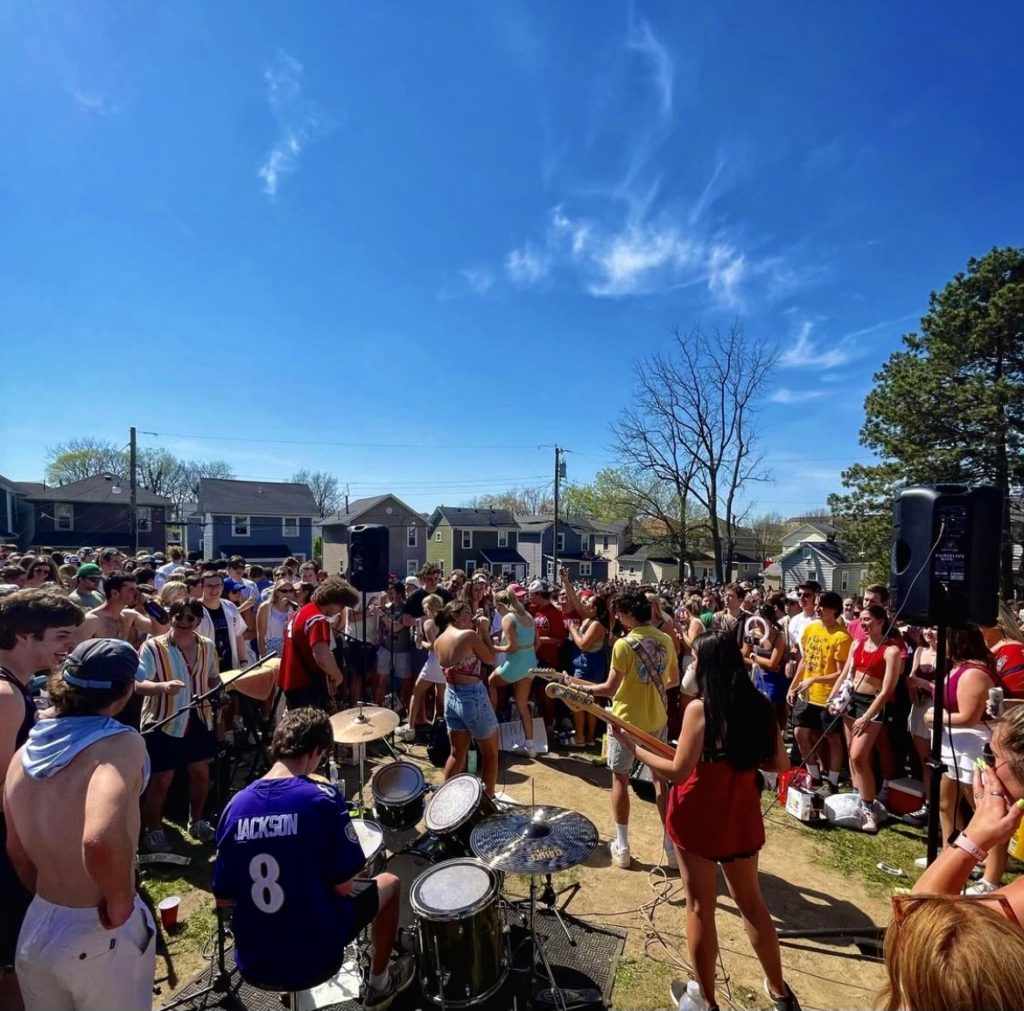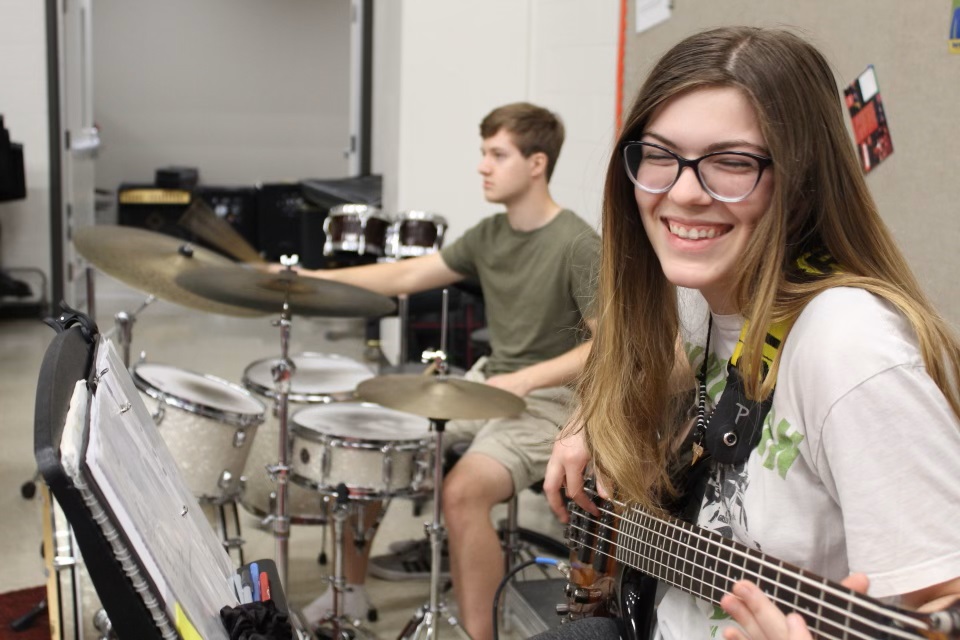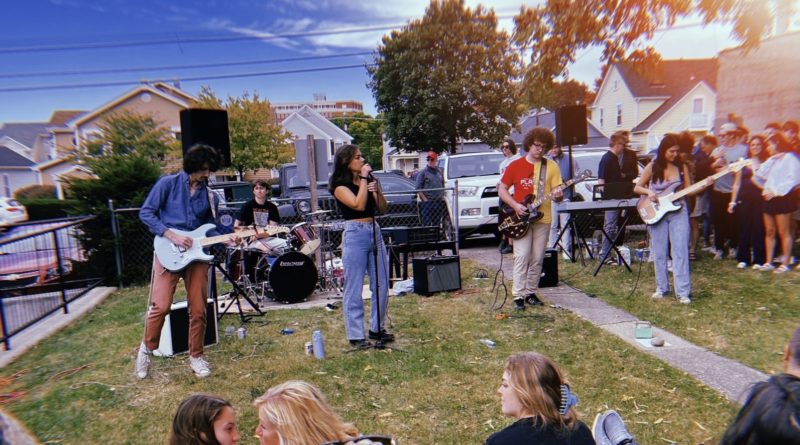‘Dayton is a band school’: Navigating student band restrictions and free expression at UD
Creasers, a student band formed in the spring, played backyards and basements last semester. Now, the university is shutting down pop-up shows out of a concern for the safety and security of campus. Photo courtesy of Creasers’ vocalist Grace Litavsky.
Zoë Hill | Print Editor-in-Chief
Bridget Rasure | Contributing Writer
Ren Sikes | Opinions Editor
Student bands at the University of Dayton were making a lot of noise on campus until a new university rule enforced restrictions on when and where they can play. Now, these bands are making even more noise — and not just with their instruments.
A month ago, junior Rob Langhals started a petition on Change.org in response to rules that restrict student band performances on campus. Over 2,400 students, parents, alumni and community members have added their signature to the petition since it went live.
The issue seems to be drumming up attention around campus, but the question stands: should live music be allowed in the student neighborhood? We talked to student bands and UD administration, and we polled our audience to find out. Here’s what we learned and why it matters so much for the campus community.
WHAT’S THE RULE?
In a conversation with Associate Vice President and Dean of Students Christine Schramm and Assistant Vice President and Chief of Police Savalas Kidd, we cleared up some rumors on the rules around live performances and really defined the purpose behind them.
“We want to support the bands, but we want to make sure that we’re creating a safe environment for them,” Schramm said.
Schramm agrees with students that live music on campus appears to be “good, clean fun,” but part of her role as dean of students involves looking beyond the surface and addressing concerns of student safety.
“We have to take it to the next step where we see that it jeopardizes safety and security,” Schramm said. “I think that gets frustrating, and I ask that students trust us that we have your best interests in mind here.”
Mitigation of informal and unsanctioned performances, specifically in the student neighborhoods and on weekends, comes down to the safety of the campus and the student body for the administration. They advise student bands to pursue formal channels for performances to better understand the laws and responsibilities of a performance. These avenues include the Center for Student Involvement supported by a registered campus organization, the Brook Center, Public Safety or sponsorship by an academic department.
“There’s a lot of discretion when it comes to enforcement,” Kidd said. “When the situation presents a health and safety risk, that discretion is limited.”
The issue doesn’t lie with live bands themselves, but rather the management of dangerous student activity in the neighborhood on the weekends, according to Schramm. Student bands open the university up to potentially hazardous circumstances like burglaries when doors are left open or injury and damage when emergency vehicles can’t move down the streets. All of this escalates when combined with the “symptoms of a daydrink” during peak times on Saturdays, they said.
“Bands are coupled with high-risk drinking, with disorderly behavior, on top of other criminal activity taking place in the neighborhood like burglaries,” Kidd said. “In order to mitigate all of those things, you have to be able to address the root cause. There are certain areas and times that the university wants to support student bands to play, keeping various boundaries and policies in mind.”
Publicizing unsanctioned campus gigs in the neighborhood on social media also makes the university vulnerable to attracting non-UD students to these performances.
Student bands went through the proper channels and met the requirements to play a show at ArtStreet coming Friday. Schramm said this show illustrates how the university is supporting student bands while also upholding the safety and security of students on campus.
They also emphasized the distinction between university-sanctioned performances and pop-up shows. When student bands play informally on porches, at empty lots and in backyards, the university sees an “escalation of behavior the institution cannot manage,” Schramm said.
Noise is also a factor. According to the Dayton Municipal Code section 94.04, “No person shall make, continue, or cause to be made or continued any loud, unnecessary or unusual noise or any noise which either annoys, disturbs, injures, or endangers the comfort, repose, health, peace, or safety of others, within the limits of the city.”
In addition to safety, it comes down to learning for UD administration, Schramm said. Making sure the campus community is a space conducive to learning and allowing students to explore their vocation is a top priority of the dean of students office.

Photo couresty of Grace Litavsky.
WHAT ARE THE BANDS SAYING?
Members of the student band The Odd Ones Out found out about the rule on September 17 when they were playing a set in the backyard of a house in the south student neighborhood. They were also told that the ArtStreet Amphitheatre is unavailable to book on Friday and Saturday nights and Saturday afternoons.
“There were college bands that got shut down before like Kindergarten, but I feel like it’s more popular now to be in a band,” lead singer Caroline Herling said.
The Odd Ones Out works closely with the university to perform sanctioned events as often as possible. The group meets on Thursday nights in the Fitz Hall band room which they book through the university’s music department.
Langhals, the man behind the petition, is the drummer for The Odd Ones Out. He and Herling described its sound as music the band thinks college students want to hear, including alternative, rock and pop punk, although nearly all five members are classically trained in jazz.
They’ve begun booking shows off-campus. This past weekend, the band played to a crowd of mostly UD students at Timothy’s Pub and Grill on Brown Street, just a few blocks from the backyard they got shut down at.
“With the rules in place, it’s not conducive for us to play here,” Langhals said.
Many of the student bands keep in contact with each other via a group chat. They’ve shared their worries and frustrations about the enforcement of the rule with each other as they figure out how to continue doing what they love.
Creasers started up in the spring when now-bandmates Grace Litavisky and Coleman Cryderman were asked to play Earth Fest. They had been casually playing together, but formed Creasers for that gig in April. The band hadn’t noticed any pushback until this semester.
“When we started playing there wasn’t any response,” Cryderman said. “That’s the thing — it has only become an issue this year. I don’t know if it’s in part due to there being like six [student] bands now, but last year it wasn’t a thing and in years prior it wasn’t a thing either.”
Litavisky, the lead singer for Creasers, has been at the forefront of the issue since she heard about her friends in The Odd Ones Out being shut down. She heard the reason The Odd Ones Out was shut down by police was because of the noise level and the lack of a permit. She called the city of Dayton to get a permit, but was met with confusion.
Employees in the city office weren’t aware of a permit that applied to the situation, Litavisky said. She then called UD Public Safety and spoke to Chief Kidd, who reaffirmed to her that there is no need for a permit. According to her, Kidd provided the city’s noise ordinance that applies to campus.
Shortly thereafter, Center for Student Involvement met with Litavisky and informed her that she would be liable for any injuries that occur while the band was playing and “encouraging the chaos.” She said she was told she shouldn’t be playing on UD property; Creasers has only performed at landlord houses with the permission of the tenants and some of the landlords, according to the band.
Litavisky said she is confused about the enforcement of the regulations and feels targeted by it. She brought up that Barstool Flyers, who routinely draw crowds in the student neighborhood, campus DJs and students blasting music from their speakers aren’t being held to nearly the same standards.
She acknowledges that the administration is doing their jobs in keeping students safe, but the regulations themselves are where she feels limited. The band recognizes “the want for some more order on campus,” but, in Litavisky’s experience, her band hasn’t had a show where people have gotten out of control or too drunk. She has, however, encountered students fighting and crowding the streets at house parties without live bands.
Members of The Odd One Out and Creasers agreed they see live music performances as an opportunity for Public Safety to manage the crowds in the neighborhoods. Langhals said his band moves people out of the streets and into backyards. As a student who doesn’t drink, he said student bands are an asset to including those who don’t drink in the community and fun of a Saturday afternoon in Dayton.
“Yes, it’s going to draw a crowd but a crowd doesn’t mean chaos, problems, injury and drunkenness. Those are not the same thing,” Litavisky said. “It can lead to that, potentially, but everything can lead to that. It is not specific to live music.”
Members of Creasers are worried that continuing with neighborhood gigs would put their ability to earn a degree at risk. They don’t want to lose their form of expressing themselves, either.
“All of us are musicians that take music very seriously. We’re not just trying to make loud noise and disrupt the peace and be obnoxious. We formed the band because we played together, and we were passionate about it and made great music together,” Litavisky said. “I don’t think that I should have to choose between that and graduating.”
The compromise here isn’t really a compromise at all, Litavisky said. To adhere to the restrictions, student bands can play at the ArtStreet Amphitheatre, which can only be reserved if the event is sponsored by a university department or recognized student organization. Creasers will play events hosted by student organizations, but the band said those opportunities are few and far between.
“It’s like playing chess but they [the university] have all the rules, and they’re changing them whenever they need to,” Herling said.
So what’s the real compromise then?
The Odd Ones Out suggested an actual permit process to let the university know where and when the band plays. They intend to remain in communication with the Brooks Center located in ArtStreet about performing at the amphitheatre. Additionally, they continue to pursue alternative ways for student bands to perform for their peers on campus such as on Kennedy Union Field or Stuart Field.
If ArtStreet is the most viable option, the band suggested an umbrella organization of student bands so they can book the amphitheater themselves with an official department or club sponsor.
Creasers seconded the permit system, but also agreed to follow any kind of noise restrictions and continue to only play landlord-owned houses.
Both bands are meeting with President Eric Spina on Nov. 4 to discuss the regulations.
WHAT’S THE BUZZ ON CAMPUS?
The petition that spread from the halls of Stuart Hall to the Darkside has brought a lot of attention to UD’s student bands in the last four weeks. Signers have been vocal on why they love UD student bands.
“Free music on campus brings many students together including students who don’t drink but want to fit in and be part of something social and entertaining,” Jennifer Rego said.
“Live music, especially in the college atmosphere, is where a lot of memories are made,” Matthew Rego said. “The live music is what makes our campus so unique and fun. This is an absurd rule and not the UD I grew up hearing about. Like others have said we have bigger issues to worry about, so let us FLYERS ROCK ON!”
“Dayton is a band school,” Mary Kate Mull said.
“Music is such an important part of people’s lives and the way that we experience emotion,” Stephanie Zalinski said.
We asked on Instagram if our followers supported live music and student bands on campus. Overwhelming, people said yes. In the 24 hours the poll was open, 211 people voted in favor of supporting student bands, while five people said no and two had no opinion.

summer. Photo courtesy of Herling.
WHAT DOES THIS ALL MEAN?
As a staff, Flyer News has come to the conclusion that the issue is not with administration or with the student bands — but with the rule itself. There is miscommunication that is causing the confusion for student bands who are willing to work with the administration to continue doing what they love.
The common thread petition signers, Instagram commenters and campus folk point to is how live music, specifically performed by student bands, is a community builder. And if there’s one thing that is at the soul of this university, its community. If you need more convincing on this, just look at how the student body and alumni have rallied around these bands in the wake of the shutdowns.
Live music reduces the body’s release of cortisol, the stress hormone, according to a 2016 study by researchers at the Imperial College London. Researchers at Goldsmiths University also found that listening to live music for just 20 minutes increases feelings of wellbeing by 21%, with participants reporting increased feelings of closeness to others, self-worth and mental stimulation.
Study after study has shown us that music is important for learning, in addition to its impacts on mental and physical health. Listening to music helps with social and personal development, general attainment, creativity and intellectual development in young people, according to Susan Hallam of the University of London’s Institute of Education.
But the positive impacts of music aren’t really in question here. And, this isn’t about the university’s administration either. It’s about free expression and building community safely on campus.
To move forward, a true compromise between student bands and the university needs to come about. Unrestricted performances aren’t working for the university’s commitment to keep students safe and secure. Current restrictions on live music limits student bands’ expression on campus. There is a way to marry the two, but a dialogue has to happen.
As Flyers, students, creatives, friends, peers, leaders and defenders of free expression, Flyer News offers the campus community, student bands and university administrators an opening. Let’s begin a community conversation. We need to facilitate a space where student organizations, facilities management, student services, deans’ offices, student bands, the city of Dayton and community members can talk, but more importantly, listen to each other.
For more opinion pieces, like Flyer News on Facebook and follow us on Twitter (@FlyerNews) and Instagram (@flyernews).

